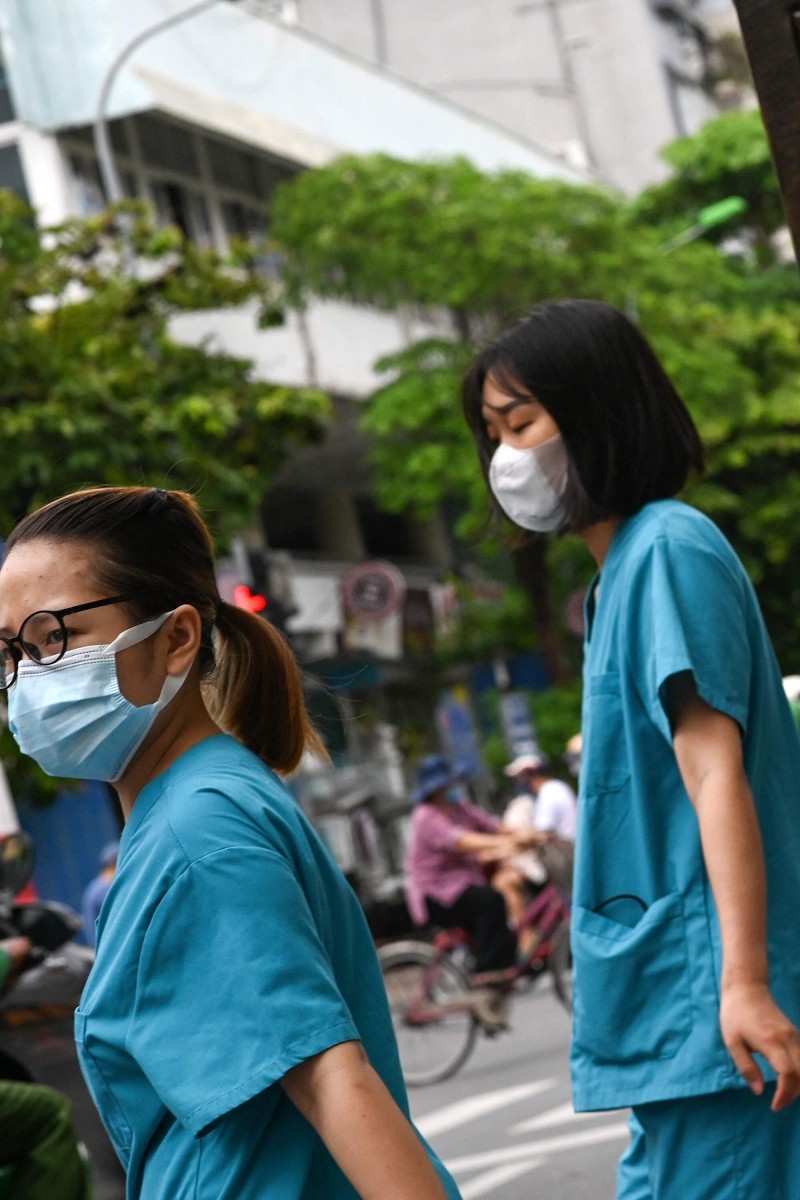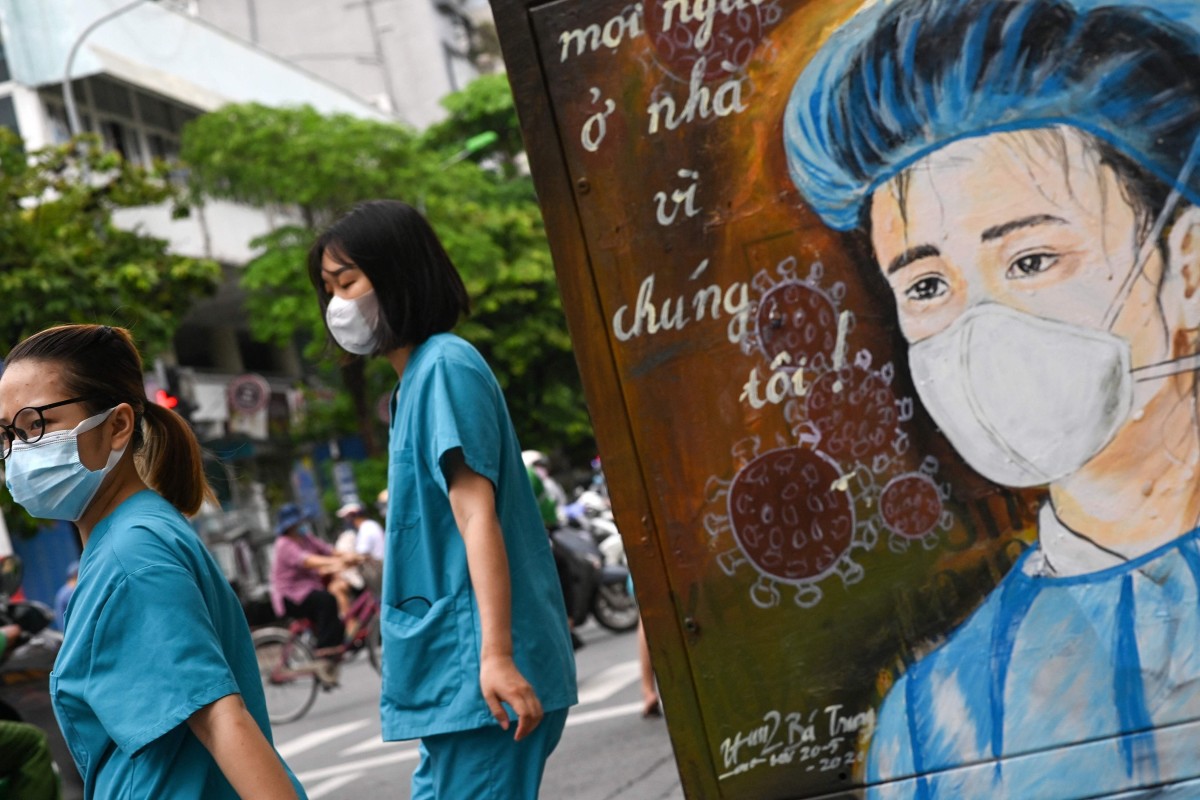
More than four million people have died from Covid-19 worldwide
- The World Health Organisation has urged rich countries to share resources and to stop acting ‘as though the pandemic is over’
- New waves of infection are surging across Asia, forcing Sydney into lockdown and Tokyo to declare a state of emergency ahead of the Olympics
 Nurses wearing face masks walk past an electricity box decorated with a coronavirus-themed painting on a street in Hanoi. Photo: AFP
Nurses wearing face masks walk past an electricity box decorated with a coronavirus-themed painting on a street in Hanoi. Photo: AFPMore than four million people have now died from Covid-19 worldwide, the World Health Organisation (WHO) said on Wednesday, as many Western nations prepare to loosen restrictions while countries in Asia battle surging infections.
Millions are facing new lock downs and Indonesia has emerged as a global hot spot, with death rates rising tenfold in a month to a record 1,040 on Wednesday.
“The world is at a perilous point in this pandemic,” said WHO chief Tedros Adhanom Ghebreyesus, calling the four million figure an underestimate of the true toll.
What to know about the delta variant
Tedros castigated rich countries for hoarding vaccines and protective equipment and accused them of acting “as though the pandemic is already over” by relaxing restrictions.
Indonesia, with a population of over 270 million, has ordered people to work from home if possible and restricted opening hours of businesses across its territory.
“I’m very scared about getting infected,” said Nesan Nusmana, who lives near a cemetery on Java
where ambulances queue to deliver the dead.
“But it can’t be helped. This is where I live. All I can do now is pray.”
A man receives a dose of Sinovac's Covid-19 vaccine during a vaccination drive at Pusong village, in Lhokseumawe, Aceh, Indonesia. Photo: AFP
New lock downs and contrasts in sports
New outbreaks have forced lock downs in Vietnam’s Ho Chi Minh City and Myanmar’s Yangon - home to more than 15 million people combined.
Sydney’s five million residents, already two weeks into a lockdown, will be staying at home for another week after 27 new cases were detected.
“It’s still scary that the virus is out there,” said Menno De Moel, 44, at a vaccination centre in Sydney where he was getting his first shot.
“Hopefully this is going to be the last lockdown, but on the other hand anything that is needed, needs to be done.”
More than 18 months since the virus first emerged in China, the world is still struggling to move on.
This is particularly true in the sporting world, where many events continue to be played with no spectators, or are postponed or cancelled altogether.
Preparations for the Tokyo Olympics, which was pushed back from last year, have been plagued by the virus.
Teens in Hong Kong are hesitant to get vaccinated
Just 16 days before the Games are due to kick off, officials scrapped the torch relay to stop crowds from gathering and are expected to announce that a state of emergency currently in place in Tokyo will continue during the Games.
Local reports suggested this would force the event to be held behind closed doors.
By contrast, England and Denmark played the Euro 2020 semi-final on Wednesday in front of tens of thousands of fans.
Should vaccination be required for heading back to school full-time?
‘Extreme caution’ urged
Britain is facing a surge in cases, but mass vaccinations have helped to keep hospital admissions and deaths comparatively low.
The government has ordered an end to almost all restrictions in England over the coming weeks.
But the WHO warned that transmission of the virus would increase regardless of high vaccination rates.
One-fifth of coronavirus patients develop long Covid
“I would urge extreme caution in the complete lifting of public health and social measures at this time, because there are consequences for that,” said WHO emergencies director Michael Ryan when asked about England’s plans.
As richer countries peel back their rules and regulations, many of the current outbreaks are hitting poorer nations.
People wait to receive a dose of Russia's Sputnik V Covid-19 vaccine at a vaccination centre in Moscow. Russia reported 737 coronavirus deaths on July 6, a national record of pandemic-related fatalities over a 24-period, as the country battles a new surge in cases. Photo: AFP
The WHO’s Tedros renewed his plea for richer nations to share their resources.
“From a moral, epidemiological or economic point of view, now is the time for the world to come together to tackle this pandemic collectively,” he said.
How students around the world are coping with Covid, one year on
But in the rich world, people are more focused on getting back to normality, with a tentative return of mass tourism.
Illustrating the difficulties of a mixed approach to virus measures, one group of US teenagers in the United States caused outrage when they refused to wear masks on a flight to the Bahamas.
“It was bad. First, they were yelling. They were cursing,” witness Malik Banks told a TV station in the US state of North Carolina. “They were being very obnoxious.”